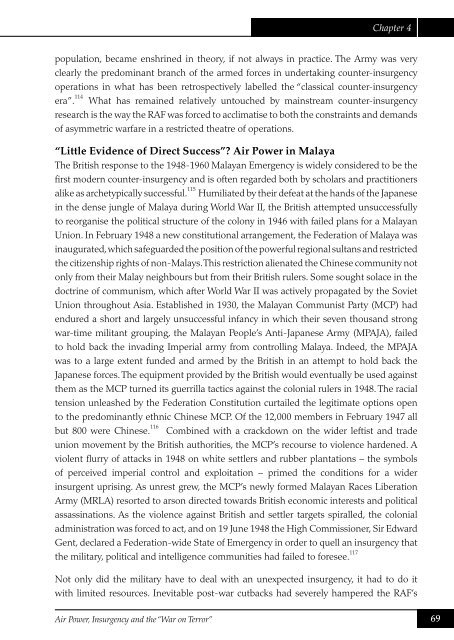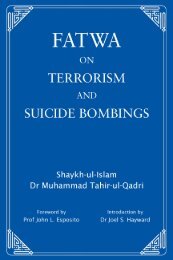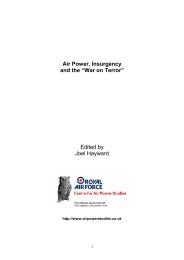Air Power, Insurgency and the âWar on Terrorâ - Prof. Joel Hayward's ...
Air Power, Insurgency and the âWar on Terrorâ - Prof. Joel Hayward's ...
Air Power, Insurgency and the âWar on Terrorâ - Prof. Joel Hayward's ...
You also want an ePaper? Increase the reach of your titles
YUMPU automatically turns print PDFs into web optimized ePapers that Google loves.
Chapter 4<br />
populati<strong>on</strong>, became enshrined in <str<strong>on</strong>g>the</str<strong>on</strong>g>ory, if not always in practice. The Army was very<br />
clearly <str<strong>on</strong>g>the</str<strong>on</strong>g> predominant branch of <str<strong>on</strong>g>the</str<strong>on</strong>g> armed forces in undertaking counter-insurgency<br />
operati<strong>on</strong>s in what has been retrospectively labelled <str<strong>on</strong>g>the</str<strong>on</strong>g> “classical counter-insurgency<br />
era”. 114<br />
What has remained relatively untouched by mainstream counter-insurgency<br />
research is <str<strong>on</strong>g>the</str<strong>on</strong>g> way <str<strong>on</strong>g>the</str<strong>on</strong>g> RAF was forced to acclimatise to both <str<strong>on</strong>g>the</str<strong>on</strong>g> c<strong>on</strong>straints <str<strong>on</strong>g>and</str<strong>on</strong>g> dem<str<strong>on</strong>g>and</str<strong>on</strong>g>s<br />
of asymmetric warfare in a restricted <str<strong>on</strong>g>the</str<strong>on</strong>g>atre of operati<strong>on</strong>s.<br />
“Little Evidence of Direct Success”? <str<strong>on</strong>g>Air</str<strong>on</strong>g> <str<strong>on</strong>g>Power</str<strong>on</strong>g> in Malaya<br />
The British resp<strong>on</strong>se to <str<strong>on</strong>g>the</str<strong>on</strong>g> 1948-1960 Malayan Emergency is widely c<strong>on</strong>sidered to be <str<strong>on</strong>g>the</str<strong>on</strong>g><br />
first modern counter-insurgency <str<strong>on</strong>g>and</str<strong>on</strong>g> is often regarded both by scholars <str<strong>on</strong>g>and</str<strong>on</strong>g> practiti<strong>on</strong>ers<br />
alike as archetypically successful. 115 Humiliated by <str<strong>on</strong>g>the</str<strong>on</strong>g>ir defeat at <str<strong>on</strong>g>the</str<strong>on</strong>g> h<str<strong>on</strong>g>and</str<strong>on</strong>g>s of <str<strong>on</strong>g>the</str<strong>on</strong>g> Japanese<br />
in <str<strong>on</strong>g>the</str<strong>on</strong>g> dense jungle of Malaya during World War II, <str<strong>on</strong>g>the</str<strong>on</strong>g> British attempted unsuccessfully<br />
to reorganise <str<strong>on</strong>g>the</str<strong>on</strong>g> political structure of <str<strong>on</strong>g>the</str<strong>on</strong>g> col<strong>on</strong>y in 1946 with failed plans for a Malayan<br />
Uni<strong>on</strong>. In February 1948 a new c<strong>on</strong>stituti<strong>on</strong>al arrangement, <str<strong>on</strong>g>the</str<strong>on</strong>g> Federati<strong>on</strong> of Malaya was<br />
inaugurated, which safeguarded <str<strong>on</strong>g>the</str<strong>on</strong>g> positi<strong>on</strong> of <str<strong>on</strong>g>the</str<strong>on</strong>g> powerful regi<strong>on</strong>al sultans <str<strong>on</strong>g>and</str<strong>on</strong>g> restricted<br />
<str<strong>on</strong>g>the</str<strong>on</strong>g> citizenship rights of n<strong>on</strong>-Malays. This restricti<strong>on</strong> alienated <str<strong>on</strong>g>the</str<strong>on</strong>g> Chinese community not<br />
<strong>on</strong>ly from <str<strong>on</strong>g>the</str<strong>on</strong>g>ir Malay neighbours but from <str<strong>on</strong>g>the</str<strong>on</strong>g>ir British rulers. Some sought solace in <str<strong>on</strong>g>the</str<strong>on</strong>g><br />
doctrine of communism, which after World War II was actively propagated by <str<strong>on</strong>g>the</str<strong>on</strong>g> Soviet<br />
Uni<strong>on</strong> throughout Asia. Established in 1930, <str<strong>on</strong>g>the</str<strong>on</strong>g> Malayan Communist Party (MCP) had<br />
endured a short <str<strong>on</strong>g>and</str<strong>on</strong>g> largely unsuccessful infancy in which <str<strong>on</strong>g>the</str<strong>on</strong>g>ir seven thous<str<strong>on</strong>g>and</str<strong>on</strong>g> str<strong>on</strong>g<br />
war-time militant grouping, <str<strong>on</strong>g>the</str<strong>on</strong>g> Malayan People’s Anti-Japanese Army (MPAJA), failed<br />
to hold back <str<strong>on</strong>g>the</str<strong>on</strong>g> invading Imperial army from c<strong>on</strong>trolling Malaya. Indeed, <str<strong>on</strong>g>the</str<strong>on</strong>g> MPAJA<br />
was to a large extent funded <str<strong>on</strong>g>and</str<strong>on</strong>g> armed by <str<strong>on</strong>g>the</str<strong>on</strong>g> British in an attempt to hold back <str<strong>on</strong>g>the</str<strong>on</strong>g><br />
Japanese forces. The equipment provided by <str<strong>on</strong>g>the</str<strong>on</strong>g> British would eventually be used against<br />
<str<strong>on</strong>g>the</str<strong>on</strong>g>m as <str<strong>on</strong>g>the</str<strong>on</strong>g> MCP turned its guerrilla tactics against <str<strong>on</strong>g>the</str<strong>on</strong>g> col<strong>on</strong>ial rulers in 1948. The racial<br />
tensi<strong>on</strong> unleashed by <str<strong>on</strong>g>the</str<strong>on</strong>g> Federati<strong>on</strong> C<strong>on</strong>stituti<strong>on</strong> curtailed <str<strong>on</strong>g>the</str<strong>on</strong>g> legitimate opti<strong>on</strong>s open<br />
to <str<strong>on</strong>g>the</str<strong>on</strong>g> predominantly ethnic Chinese MCP. Of <str<strong>on</strong>g>the</str<strong>on</strong>g> 12,000 members in February 1947 all<br />
but 800 were Chinese. 116<br />
Combined with a crackdown <strong>on</strong> <str<strong>on</strong>g>the</str<strong>on</strong>g> wider leftist <str<strong>on</strong>g>and</str<strong>on</strong>g> trade<br />
uni<strong>on</strong> movement by <str<strong>on</strong>g>the</str<strong>on</strong>g> British authorities, <str<strong>on</strong>g>the</str<strong>on</strong>g> MCP’s recourse to violence hardened. A<br />
violent flurry of attacks in 1948 <strong>on</strong> white settlers <str<strong>on</strong>g>and</str<strong>on</strong>g> rubber plantati<strong>on</strong>s – <str<strong>on</strong>g>the</str<strong>on</strong>g> symbols<br />
of perceived imperial c<strong>on</strong>trol <str<strong>on</strong>g>and</str<strong>on</strong>g> exploitati<strong>on</strong> – primed <str<strong>on</strong>g>the</str<strong>on</strong>g> c<strong>on</strong>diti<strong>on</strong>s for a wider<br />
insurgent uprising. As unrest grew, <str<strong>on</strong>g>the</str<strong>on</strong>g> MCP’s newly formed Malayan Races Liberati<strong>on</strong><br />
Army (MRLA) resorted to ars<strong>on</strong> directed towards British ec<strong>on</strong>omic interests <str<strong>on</strong>g>and</str<strong>on</strong>g> political<br />
assassinati<strong>on</strong>s. As <str<strong>on</strong>g>the</str<strong>on</strong>g> violence against British <str<strong>on</strong>g>and</str<strong>on</strong>g> settler targets spiralled, <str<strong>on</strong>g>the</str<strong>on</strong>g> col<strong>on</strong>ial<br />
administrati<strong>on</strong> was forced to act, <str<strong>on</strong>g>and</str<strong>on</strong>g> <strong>on</strong> 19 June 1948 <str<strong>on</strong>g>the</str<strong>on</strong>g> High Commissi<strong>on</strong>er, Sir Edward<br />
Gent, declared a Federati<strong>on</strong>-wide State of Emergency in order to quell an insurgency that<br />
<str<strong>on</strong>g>the</str<strong>on</strong>g> military, political <str<strong>on</strong>g>and</str<strong>on</strong>g> intelligence communities had failed to foresee. 117<br />
Not <strong>on</strong>ly did <str<strong>on</strong>g>the</str<strong>on</strong>g> military have to deal with an unexpected insurgency, it had to do it<br />
with limited resources. Inevitable post-war cutbacks had severely hampered <str<strong>on</strong>g>the</str<strong>on</strong>g> RAF’s<br />
<str<strong>on</strong>g>Air</str<strong>on</strong>g> <str<strong>on</strong>g>Power</str<strong>on</strong>g>, <str<strong>on</strong>g>Insurgency</str<strong>on</strong>g> <str<strong>on</strong>g>and</str<strong>on</strong>g> <str<strong>on</strong>g>the</str<strong>on</strong>g> “War <strong>on</strong> Terror” 69





